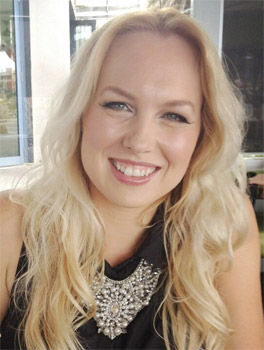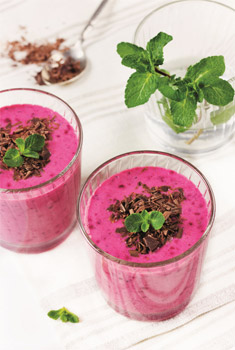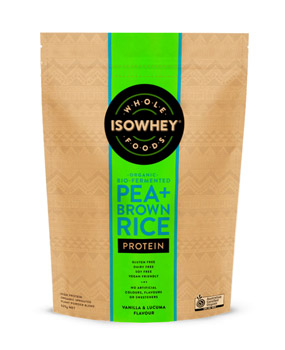Belinda Reynolds Protein Interview

Belinda Reynolds Protein Interview
Question: Why is protein an important component of our diets?
Belinda Reynolds: Protein is an essential nutrient and is needed by our body to build and repair tissues, and synthesise essential hormones, enzymes and other functional compounds (e.g. those involved in liver and immune function). In addition protein can also be an energy source if there is a lack of carbohydrates and fats in your diet.
Question: What are the top three major benefits of protein?
Belinda Reynolds: It's hard to mention just three - as they are all of equal importance! 1) Tissue Repair From muscles, to intestines, to skin, hair and nails, the amino acids from protein play a critical role in supporting the health and repair of these tissues. 2) Detoxification and Antioxidant Protection Amino acids play an essential role in forming the complexes which work to remove toxins from our body, plus they make up the body's most important antioxidant, glutathione, which also supports immune function. 3) Hormones and enzymes Many of the body's hormones and enzymes require amino acids for their appropriate production. Therefore, sufficient protein consumption is essential.
 Question: What foods are high in protein?
Question: What foods are high in protein? Belinda Reynolds: Foods such as meat, fish, eggs, nuts, seeds, legumes, greek yogurts and cottage cheese are great high protein options, however it is important to also take into account your individual dietary needs (e.g. avoid cottage cheese and yoghurt if you are dairy intolerant), and also ensure that you are choosing the right type of protein-rich foods, and preparing them correctly (e.g. avoid nuts that are roasted in vegetable oil and salted and Greek yoghurt that has been flavoured with added sugar).
Question: And of these which are the best sources of protein, for women?
Belinda Reynolds: The above protein sources are great for women and men. Iron-rich protein sources such a lean and grass-fed meats can be good to include if you're prone to iron deficiency. Avoid sources that are high in sugar, over-processed with too much salt, or fried in inflammatory seed oils.
Question: How much of our daily intake should be protein?
Belinda Reynolds: On average, we should be aiming for around 1g of protein for every kilogram of body weight. This, however, will vary depending on individual needs. For example if you are very active or unwell, this need can increase.
Question: What are the signs that we're not eating enough protein?
Belinda Reynolds: Symptoms can at times be vague, and may be confused with signs of insufficient intake of other nutrients. However, if you're hungry quite quickly after a meal, if your hair is falling out, your nails are brittle, your muscles are taking unusually long to recover (i.e. stop feeling sore), this could be a sign that you aren't eating enough. It is always good though to speak with a health professional regarding symptoms you may be experiencing as it could be a sign of something more serious.
 Question: Can you talk us through what to look for when choosing a protein powder?
Question: Can you talk us through what to look for when choosing a protein powder? Belinda Reynolds: Look for a protein powder that is low in sugar and doesn't contain added colours, flavours, artificial sweeteners or sugar (e.g. fructose). It will also depend on your individual needs - if you are looking to use your protein powder to replace a meal or snack that would otherwise include a whole food, try to look for one with additional micronutrients added, or nutrient-dense ingredients (often referred to as 'superfoods"). There are many nutrient dense ingredients available now too that can be added into shakes - look for organic ingredients as these can be a great way to increase the variety of antioxidants in your diet. You can also buy neutral flavours of protein powders that make a great smoothie base or addition to recipes (such as pancakes, muffins, breads) that if used as a replacement for less-healthy options, increases the nutritional value, and lowers the GI of that meal or snack.
Question: Is there such thing as too much protein?
Belinda Reynolds: There can be. Too much protein can place extra strain on the body and too many high protein foods which also contain other macronutrients (e.g. fats and carbohydrates) may lead to weight gain. The main health concerns stemming from too many high-protein foods may more likely come from the fact that you are missing other nutrient-dense foods (e.g. vegetables and fruit) from the diet.
Question: How can we increase protein, in our diet, without using a supplement?
Belinda Reynolds: Try adding an egg to your breakfast (e.g. rather than 2 pieces of toast, have 1 piece of toast with 1 egg). Make a smoothie for breakfast and add in almond meal and/or linseed meal plus natural greek yoghurt together with berries. Add some salmon/chicken/tuna/tofu to your lunch salad. Add a natural nut butter to your snacks, or snack on raw nuts and seeds, boiled eggs or smoked salmon on wholegrain crackers with avocado. Make dinner a meal full of vegetables with protein sources such as lean meat, fish or tofu.
https://www.isowhey.com.au/
Interview by Brooke Hunter
Have You Seen This?
MORE








